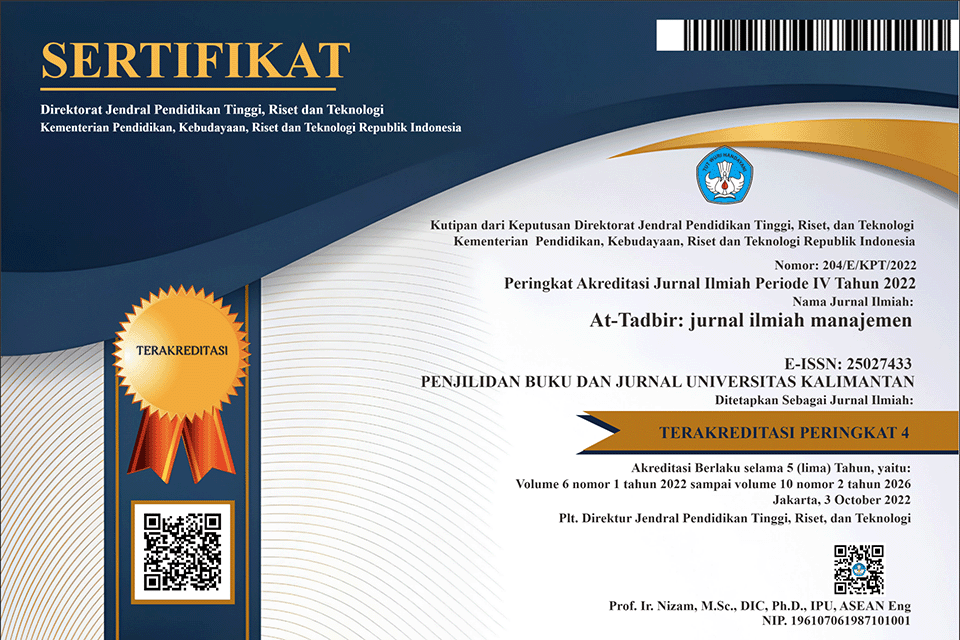PENGARUH MOTIVASI KERJA DAN IKLIM ORGANISASI TERHADAP KINERJA PEGAWAI TATA USAHA UNIVERSITAS ISLAM KALIMANTAN MUHAMMAD ARSYAD AL BANJARI BANJARMASIN
(1) UNISKA
(2)
(3)
(*) Corresponding Author
Abstract
The Role of Climate Organizations and motivations to improve employee performance are very important. This study aims to find out what are the factors that affect the performance of administrative staff at the Islamic University of Kalimantan Muhammad Arsyad Al Banjari Banjarmasin. This study uses quantitative methods, with a total sample of 60 respondents. The data analysis method used is by using multiple linear regression. The results of the study on the effect of work motivation and Organizational Climate on the performance of Administrative staff at the Islamic University of Kalimantan Banjarmasin showed the following results: The first hypothesis states the influence of motivation and Organizational Climate together have a positive influence on the performance of Administrative employees but not significant (meaningless ), The second hypothesis states that the influence of motivation partially has a positive and significant influence on the performance of administrative staff of the Islamic University of Borneo. The third hypothesis states that the influence of Organizational Climate partially has a positive and significant influence on the performance of administrative staff of the Islamic University of Kalimantan Banjarmasin not proven, because the effect is negative and not significant. So it can be concluded that only motivation has a significant effect on the performance of administrative staff of the Islamic University of Kalimantan.
Keywords: Motivation, Organizational Climate, Administrative Performance
Full Text:
112-121 (Bahasa Indonesia)References
Achmad S Ruky, 2002, Sistem Manajemen Kinerja, Penerbit PT. Gramedia Pustaka Utama, Jakarta
Agus Waryanto, 1998, Pengaruh Motivasi Terhadap Peningkatan Kinerja Aparat di Lingkungan Secretariat Wilayah/ Daerah Tingkat I Jawa Tengah
Algifari, 1997, Analisis Regresi, Kasus dan Teori, Penerbit BPTP, Yogyakart
Algifari, 2000, Analisis Regresi, Teori, Kasus dan Solusi, Penerbit BPFE, Banjarmasin.
Aribowo Prijosaksono, 2004, Iklim Organisasi dan Motivasi. Jakarta: Ghalia Indonesia.
Bass, B.M. and Avolio BJ, 1985, Transformasional Leadership Development : Manual for the Multifactor Leadership Questioner, Palo Alto,Consulting Psychologist Press Inc, California
Burn, JM, 1978, Leadership, Harper & Row, New York.
Clayton Aldeefer, 1997, Educational Reseach, Pearson, New York.
Cooper and Emoy, 1995, Business Reseach Methods, McGrraw-Hill, Irwin, Boston.
Darmawan Wibisono, 2000, Riset Bisnis, BPFE, Banjarmasin.
Dubin, 1967, Method for Policy Reseach, Sage Publication, Baverly Hill-London.
Frederick Herzberg, 2011, Program Evaluation, Pearson, New York.
Gary Dessler, 1997, Esensi Iklim Organisasi, alih bahasa Aris Ananda, Penerbit Mitra Utama, Jakarta.
Ginson et all, 1996, Basic Statistic for Business and Economic, Fifth Edition, McGraw-Hill.
H. Noeng Muhadjir 2000, Metodologi Penelitian Kualitatif, Rake Sarasun, Banjarmasin.
Hemphill, 1954, Basic Statistic for Social Reseach, McMillan Publishing, Co Inc.
JJJ. Wuisman, 1996, Penelitian Ilmu-Ilmu Sosial: Asas-asas, Jilid I, Lembaga Penerbit Fakultas Ekonomi Universitas Indonesia, Jakarta.
John W. Creswell, 1994, Research Desaign: Quantitative and Qualitative Approachs, Sage Publication, hal 4.
Kerlinger, 1973, Foundation of Behavioral Research, Victoria, Thomson Learning.
Lawler and Porter, 1967, Handbook of Survey Research, Academics, Press, Inc.
Manulang, 1981, Manajemen Personalia, Penerbit Balai Aksara, Jakarta.
Mairr, 1965, Research Methods in Sociology, Cengange Leaning Australia,
Masri S dan Sofian Effendi, 1981 dan 1995, Metode Penelitian Survey, LP3ES, Jakarta.
Moh As'ad, 1998, Psikologi Industn, Penerbit Liberty, Banjarmasin
Pawar and Eatman, 1997, Social Reseach Methods: Qualitative and Quantitative Approaches, Third Edition, USA: Allyn and Baconn, hal 60.
Pawar, BS, and Eastman, KK, 1997, The Nature and Implication of Contextual Influences on Transformasional Leadership: A Conceptual Examination. Academy of Management Review, Vol 22, No. 180-190.
Robbins, 1989, Teori Organisasi: Struktur, Desain, dan Aplikasi, Penerbit Arcan, Jakarta.
Robbins, Stephen P, 1996, Perilaku Organisasi-Konsep, Kontroversi, Aplikasi, Jakarta: PT. Prenhallindo.
Simamora, 1997, Manajemen Sumber Daya Manusia, Penerbit STIE YKPN, Banjarmasin.
Soehardi Sigit, 2001, Pengantar Metodologi Penelitian, Penerbit BPFE UST, Banjarmasin
Sondang P Siagian, 1995, Manajemen Sumber Daya Manusia, Penerbit Bumi Aksara, Jakarta
Sritua Arief, 1993, Metodologi Penelitian Ekonomi, Penerbit Ul-Press, Jakarta
Sugiyono, 2002,, Metodologi Penelitian Bisnis, Penerbit CV. Alfabeta, Bandung
Suharsimi Arikunto, 1995, Manajemen Penelitian, Penerbit Rineka Cipta, Jakarta
Sumadi Suryabrata, 2002, Metodologi Penelitian, Rajawali Press, Jakarta.
Terry 1960, Asas-Asas Manajemen (Principle of Management), Bandung : Penerbit ALUMNI.
Thoha, 2001, Dimensi-Dimensi Prima Administrasi Negara, Banjarmasin : Fisipol
Tjahjo Retno Adhi, 2005, Pengaruh Motivasi dan Gaya Iklim Organisasi terhadap KinerjaPegawai Tata UsahaAdministrasi UPN "Veteran" Banjarmasin
Uma Sekaran, 1992, Research Methods for Business, John Wiley and Son Inc.
Yulk A Gary, 1989, Iklim Organisasi Dalam Organisasi, alih bahasa Jusuf Udaya, Penerbit Prenhallindo, Jakarta.
DOI: http://dx.doi.org/10.31602/atd.v3i2.1937
Refbacks
- There are currently no refbacks.
Copyright (c) 2019 Nasrullah Nasrullah, Sulastini Sulastini, Muhammad Harlie
---------------------------------------------------------------------------------------------------------------------
At-Tadbir: Jurnal Ilmiah Manajemen is licensed under Creative Commons Attribution-Share A like 4.0 International License




